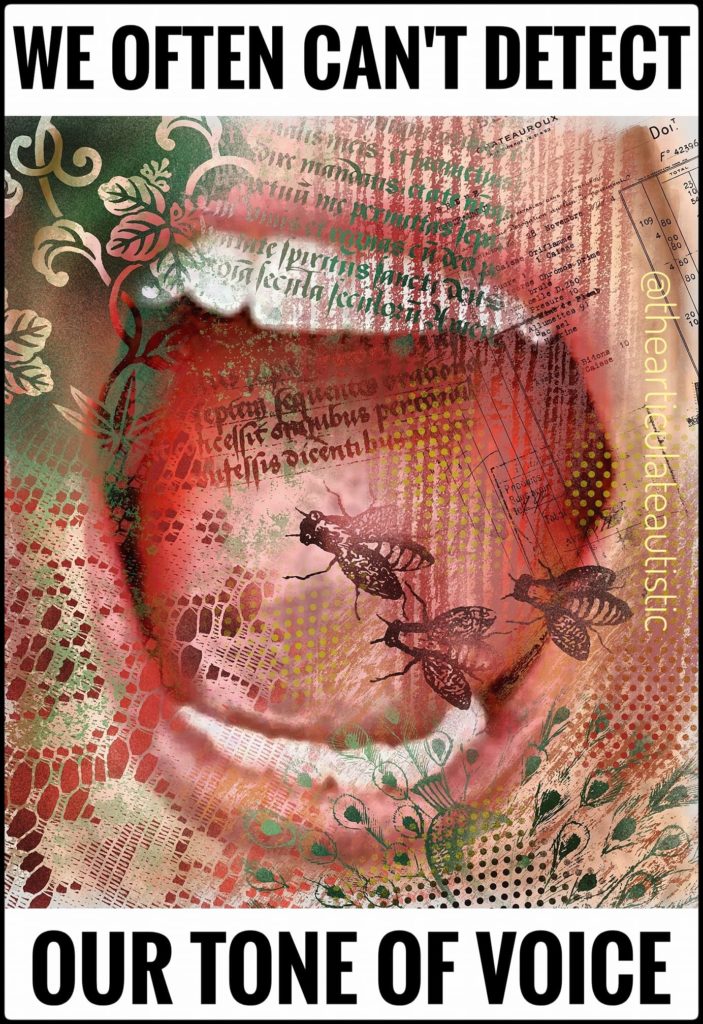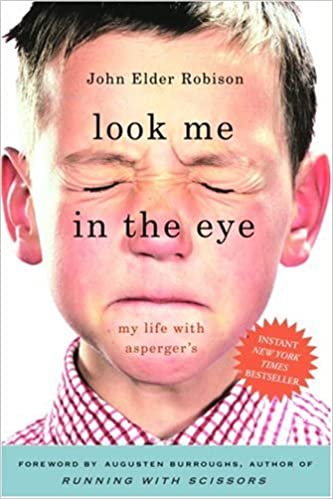Autistic People Often Can’t Detect Our Own Tone of Voice

This is very similar to the post I made about facial expressions, and it’s in the category of Autism 101 for me.
Meaning, these are some of the absolute basics of what people on the spectrum struggle with (that somehow isn’t even taught to professionals).
Like facial expressions, neurodivergent people often cannot hear the tones of our own voices.
From what I understand, neurotypical people communicate largely by subtext. There are words, but the tone of voice, facial expression, and body language convey the bulk of the meaning.
With neurodivergent people, the words themselves are the most important. Unfortunately, since NT culture is so used to looking for subtext, those words are often lost behind “blank” facial expressions and “flat” vocal tones.
So much is read into these aspects of communication, that the actual words can literally get completely lost, even if the words are practically life and death for the neurodivergent person.
Meaning, an ND person may be literally and quite articulately conveying that they are upset, confused, hurt, or experiencing sensory overload, and the NT person they’re trying to communicate with does not hear these words, and, instead, focuses on non-verbal cues where there really are none!
– Jaime A. Heidel
This can become a serious problem in certain situations. If you misunderstand each other about what time you’re going to see a movie, that’s one thing, but if it’s something urgent, this “policing of tone” can have DISASTROUS consequences!
Example:
Benny has been hanging out with his cousins for most of the day. He’s followed the social rules, worn the mask, and dealt with minor sensory overload without too much trouble.
At one point, one of his cousins takes a toy duck from the dog and starts squeaking it right in his ear. Benny covers his ears, winces, and tells him to stop, but he just keeps it up.
Finally, Benny runs back into the house where the adults are talking politics over wine coolers, and, mask gone at this point, loudly proclaims that his cousin is being a dipshit.
Not only is Benny very vocally loud, but his eyes are as wide as saucers, his face has gone completely slack, and he is shaking violently.
One of the adults, duck boy’s father, takes what Benny is saying as a personal affront to his son, and “sticks up for him” by yelling at Benny about his language and how dramatic he’s being and to “toughen up” and stop acting so weird.
Benny, absolutely exhausted from the day and experience, falls into a violent and sobbing meltdown, which only makes his uncle more furious, making him yell more, making the situation 10 times worse by the second.
I think many of us have been Benny.
(Article continues below.)
The best way to improve communication with your autistic loved one is to understand how your autistic loved one’s mind works! Intentions, motivations, and personal expressions (facial expressions or lack thereof, body language, etc.), are often quite different in autistic people than they are in neurotypical people.
Experience a better understanding of your autistic loved one by reading books about life from an autistic perspective as well as stories that feature autistic characters. You’ll have so many “Ah ha!” moments and start seeing your autistic loved one in a different light (and you’ll have a better understanding of their behaviors, which you may have been misinterpreting up until now).
Books I recommend for a better understanding of your autistic loved one:
Overwhelmed, overloaded, and overstimulated to the point where we forget social hierarchy and the mask and just start swearing or telling it like it is, and, the NTs we’ve tried to reason with have pounced on our social error immediately without looking at the bigger picture, worsening meltdowns and causing serious trauma.
No, Benny wasn’t even fully aware he swore nor could he even guess how his behavior was affecting the adults. He was far too distressed and in need of immediate help.
But here’s the thing, not being able to recognize the tones in our voices can cause problems even when we are NOT going through something that extreme.
Just like our facial expressions, we often do not even realize when our tone of voice is changing in pitch, volume, intensity, or inflection.
And NT people have such a sharp, discerning ear when it comes to even minute changes in vocal tone, that this can derail a conversation or an attempt to address an unmet need or ask a question before more than a few words have been exchanged.
Entire arguments can take place over the tone of a person’s voice after even the slightest change, and that is very scary to us.
– Jaime A. Heidel
Because, to us, your response comes out of nowhere, and we don’t know what we could have done to cause it. After all, everything was fine a minute ago. What changed?
It can take a very long time for an ND person to even BELIEVE an NT person is really responding to anything and not just going off randomly! (This disconnect causes serious trust issues on both sides.)
Also, and this is so important, when an NT person interrupts an attempt at a critical piece of ND communication to bring up tone of voice, it feels, to us, like we’ve come to you bleeding out, but you ignore that because you’ve noticed we have a strand of hair out of place, and that MUST be addressed first before the medical emergency is even considered.
To us, it can come across as shallow and utterly ridiculous! It did to me for so many years. I’m just now really piecing this all together and inderstanding how important tone of voice really is to the NT community.
But, please, neurotypicals, understand this, one of the most helpful things you can do for a neurodivergent person, especially a neurodivergent person in distress, is to focus on and respond to the words and signs of possible distress.
The words convey our meaning. There’s not a whole lot of subtext with us. Words, spoken or written, are very direct and literal. (I can’t speak for those who are non-verbal, but actions convey meaning, as well, but that’s a whole other post.)
Follow me on Instagram.
Want downloadable, PDF-format copies of these blog posts to print and use with your loved ones or small class? Click here to become a Patreon supporter!








I just have to state that an individual person or group of the same neurotype cannot be neurodiverse, just as an individual creature or species cannot be biodiverse. Please correct your misuse of the word ‘neurodiverse’ to ‘neurodivergent’.
Done. Yep. A lot of my old posts have that word. I was still learning.
I think I understand, but to confirm (because I am also still learning):
“Neurodiverse” is used to refer to the entire human neurology in general, as in, “This is a very neurodiverse workplace.”
“Neurodivergent” is used to refer specifically to those whose neurologic makeup is unlike the vast majority of those around them, as in, “Jasper is neurodivergent, they are autistic, just like their partner.”
Am I correct?
Yes, correct.
I have a question for a different flavor of this situation. Background: My sister (40) and I (43) live together. She doesn’t understand vocal tone just volume, I have finally gotten this and listen to her words not her tone when she is anxious.
Here is the situation: She has a 1 year old son. She is the primary caregiver, and our mom and I are her backup. He does not understand about her anxious tones and gets scared when they come out (very infrequently but it still happens). I’m scouring the internet to find ways to help them both. He is too young to communicate with us on any level to understand this level of nuance. What do I do?
Hello, Kat. Will you send me an email with a bit more detail and clarification on your situation? I’d be happy to help. thearticulateautistic@gmail.com